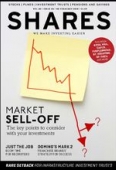Archived article
Please note that tax, investment, pension and ISA rules can change and the information and any views contained in this article may now be inaccurate.
Weighing up the impact of the market sell-off

The past week has been a haunting experience for many investors with a pullback in stock markets around the world.
The US Dow Jones Industrial Average endured its worst ever one-day fall on 5 February, down 1,175 points to 24,345.
As we write (6 Feb) the FTSE All-World index has fallen 5.4% since the beginning of February – a very big move in just a handful of trading days.
The VIX index, which measures market volatility, surged to just over 50 on 6 February, its highest level since 2015 and up from 13.75 at the start of the month.
The selling pressure seems to have achieved a momentum of its own. Most observers attributed the weakness to expectations for acceleration in US interest rate hikes as the Federal Reserve contends with the threat of rising inflation.
WERE THERE ANY WARNING SIGNS?
We discussed the risk of an imminent market correction in the US in the 25 January edition of Shares after the yield on two-year US government bonds eclipsed the dividend yield from US stocks.
The logic was that if the income on offer from low-risk government bonds was higher than more risky equities, then investors might begin to trim their exposure to the latter in favour of the former. Experts have also been warning that US stocks were becoming overvalued for some time.
ARE THERE ANY CONCERNS ABOUT THE ‘REAL’ ECONOMY?
Although a prolonged sell-off in the markets would have a wider economic impact given the hit to people’s pension pots, savings and investments and the availability of capital for companies, short-term volatility is unlikely to do any lasting damage.
However, there are some reasons for caution despite global growth and corporate earnings looking robust for now.
Inflation is something to monitor closely as it has a big influence on consumer and corporate spending habits and therefore economic activity.
Most notably, we’d point to the level of global inventories – the raw materials, partially finished products and finished goods held by companies – going up fast.
Investment bank Liberum comments: ‘Global inventories are on the rise, with widespread bottlenecks. US inventories increased sharply this month. EU inventories are above 50 for the third month in a row, for the first time since mid-2008.’ A figure over 50 implies expansion.
‘This is the fourteenth month of US orders above 60; over the last 50 years US orders remain above 60 for 10 months on average, with 17 months being the longest period in 2003-04.’ Liberum implies that a fall in orders below 60 and inventories remaining high due to bottlenecks could be the first sign that corporate earnings have peaked.
WHICH STOCKS AND SECTORS HAVE BEEN WORST AFFECTED BY THIS MONTH'S DECLINES ON THE UK STOCK MARKET?
The worst performing sectors in the sell-off for UK-listed stocks are mostly at the cyclical end of the spectrum, meaning they are very sensitive to fluctuations in the markets and the economy.
Among the worst performing FTSE 100 stocks in the wake of the global market sell-off are Vodafone (VOD), which disappointed the market with a recent trading update; health and safety kit firm Halma (HLMA) whose premium valuation left it vulnerable to an equity de-rating; and equipment hire business Ashtead (AHT).
The mid cap fallers are mainly firms which have been hit by unrelated negative news and include office provider IWG (IWG) and defence firms Cobham (COB) and Ultra Electronics (ULE). They sit alongside transport operators Stagecoach (SGC), which is to lose the East Coast mainline franchise early, and Go-Ahead (GOG); as well as asset management firm Man Group (EMG).
On AIM, growth stocks have been hard hit with double digit declines in many companies on high equity valuations which had previously enjoyed strong upwards momentum.
HOW DOES THIS EVENT COMPARE WITH OTHER SELL OFFS?
Headlines calling the worst fall for the Dow Jones on record are somewhat misleading as they are merely discussing the decline in terms of points – and the index had recently hit record highs.
In percentage terms, the Dow Jones was down 4.6%. This is undoubtedly a big move, the biggest since August 2011, but not even close to ranking in the 20 biggest percentage falls on record.
Notably after a big fall at the market open in London on 6 February, bargain hunters began to emerge, lifting the FTSE 100 off its lows. (TS)
Important information:
These articles are provided by Shares magazine which is published by AJ Bell Media, a part of AJ Bell. Shares is not written by AJ Bell.
Shares is provided for your general information and use and is not a personal recommendation to invest. It is not intended to be relied upon by you in making or not making any investment decisions. The investments referred to in these articles will not be suitable for all investors. If in doubt please seek appropriate independent financial advice.
Investors acting on the information in these articles do so at their own risk and AJ Bell Media and its staff do not accept liability for losses suffered by investors as a result of their investment decisions.
Issue contents
Big News
- BP wins the battle of the oil majors
- Shoppers keep calm and carry on
- Four important stories from the past week: Capita, Purplebricks, BT and Vodafone
- Ocado story sours again
- Tesco impresses with profit and dividend guidance
- Weighing up the impact of the market sell-off
- Why Royal Mail’s pension breakthrough is such a big share price catalyst

 magazine
magazine











